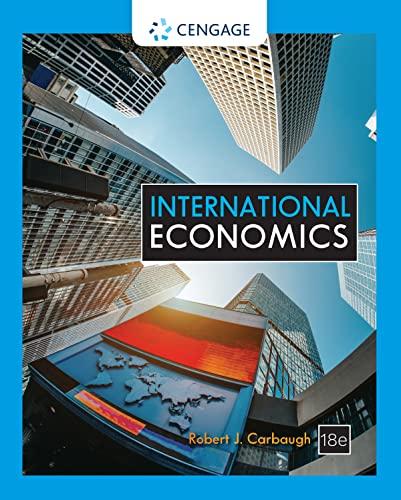The United States and China are the world's two largest economies, and their trade and investment linkages
Question:
The United States and China are the world's two largest economies, and their trade and investment linkages are expanding. Although the two countries have sought to cooperate on many topics regarding trade, finance, and the environment, they disagree on a number of issues. For example, they often take each other to the World Trade Organization, where they squabble over tariffs applied to automobile tires, export restrictions on rare earth minerals, and illegal dumping of wood furniture. Mistrust often characterizes the relationship of the two countries.
Many observers maintain that the economic landscape between China and the United States needs to improve. One way of achieving this is by negotiating a bilateral free trade and investment agreement between the two countries. Although such an agreement is unlikely to occur in the near future, there are several reasons to support one.
• There are significant economic gains that could be attained when each country expands the sectors of its comparative advantage. Because these sectors pay wages above the national average, employment would tend to shift in this direction. Also, consumers would benefit from a cheaper and more diversified selection of goods and services.
• Economic reform in both countries would be encouraged by a free trade and investment agreement. The U.S. economy would move in the direction of more investment and exports, while China would move toward more consumption and services.
• The rules of the WTO do not adequately address many issues of disagreement between China and the United States, such as the dollar-yuan exchange rate, the role of state-owned enterprises, the protection of intellectual property rights, and commercial cyberespionage. A comprehensive trade and investment pact between China and the United States could address these topics and thus decrease the risk of conflict between the two superpowers.
However, there are a number of obstacles that would have to be resolved before China and the United States could seriously consider negotiating a trade and investment agreement. Here are some of them:
• A free trade agreement could result in adjustment burdens for China and the United States. For example, job losses and wage reductions would likely occur for Americans that compete with manufactured goods that are imported from China. For China, disruptions would take place in agriculture and the service sector that compete against the United States.
• The economic relationship between the two countries is quite unbalanced. The world's largest deficit and debtor nation is the United States, and most of its imbalance is with China. China is a major surplus country, and most of it is with the United States. These imbalances contribute to the unwillingness of the United States to liberalize trade with China.
• The United States is an economically advanced country and China is a developing economy. China maintains that the differences in levels of development between the two countries justifies its opposition to standards that the United States requires in all of its trade negotiations, such as protection of the environment and workers' rights.
• A lack of trust between the two countries may be the most important issue of all. Many Americans feel that China is trying to achieve world domination at the expense of the United States. Many Chinese feel that the United States desires to limit their economic and political influence in the world. Over time, such mistrust can result in antagonistic relations between these super powers. Proponents of a U.S.-China bilateral free trade agreement note that a number of countries have already implemented or launched negotiations on free trade agreements with China, including Japan, South Korea, Australia, and New Zealand, which is all the more reason not to wait any longer to improve the relationship between the United States and China.
What do you think? Do you feel that the United States and China are close to entering into discussions for a free trade agreement?
Step by Step Answer:






